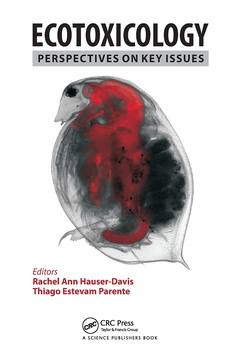Ecotoxicology Perspectives on Key Issues
Coordonnateurs : Hauser-Davis Rachel Ann, Parente Thiago Estevam

This book presents an integrated discussion on ecotoxicology, containing both general concepts and specific ecotoxicological issues of major biological groups, extending beyond conventional systems. It explores worldwide, regional, and biocompartmentalized topics, bringing forth new points of view on global issues and addressing the increasing diversity and complexity of the ecotoxicological field. It also contains novel information on emerging contaminants, presents bioaccumulation effects on different levels of ecological organization and risk analyses, and discusses novel fields of methodological applications, including key aspects in ecotoxicological and environmental monitoring studies.
What Can Proteomics and Metalloproteomics Add to Aquatic Toxicology and Public Health?. Biodiversity and Ecotoxicology: The Case of Loricariidae Fish. Ecophysiology: Implications of Climate Change Applied to Aquatic Ecotoxicology. Marine Mammals as Environmental Sentinels Focusing on Mercury Contamination. Ecotoxicology of Pharmaceutical and Personal Care Products (PPCPs). Risk Assessment of Organic UV Filters in Aquatic Ecosystems. Persistence of Organic Pollutants: Half Life or Mineralization and its Factors of Influence. Implementing the Current Knowledge of Uptake and Effects of Nanoparticles in an Adverse Outcome Pathway (AOP) Framework. Development of a Management Tool for Environmental Assessment of Organo-nitrogen Pesticides in Surface Water from Everglades and Biscayne National Parks and Big Cypress National Preserve, South Florida, USA. Conceptual Challenges in the Translation of Toxicological Research into Practice: Low-Dose Hypothesis and Dose-Response Non-monotonicity. Conventional Wastewater Treatment Plants as a Discharge and Source Point for Biota Exposure to Micro-pollutants. Monitoring of Two Taste and Odor Causing Compounds in a Drinking Water Reservoir. Biomarkers of Susceptibility for Human Exposure to Environmental Contaminants.
Rachel Ann Hauser-Davis has both a bachelor’s and licentiate’s degree in Biological Sciences from the Federal University of the State of Rio de Janeiro (Rio de Janeiro, Brazil). She has a Master’s degree in Analytical Chemistry, majoring in Environmental Chemistry and a Doctorate degree in Sciences – Analytical Chemistry, majoring in Environmental Proteomics and Metallomics, both from the Pontifical Catholic University of Rio de Janeiro (Rio de Janeiro, Brazil). She has held some major research fellowships, including a post-doctoral fellowship at the State University of Campinas (São Paulo, Brazil) and at the Biosciences Institute of the Federal University of the State of Rio de Janeiro (Rio de Janeiro, Brazil), where she is currently a guest investigator and scientific advisor.
Prizes won include the Taylor & Francis book award in conjunction with Journals of Toxicology and Environmental Health for best poster presentation at the 1stIbero-American Meeting on Toxicology and Environmental Health (2009) on the influence of metal contamination of piscine morphometric indices, an award by the Brazilian Computational Society for best poster presentation at the XII Regional School of North Informatics concerning the determination of hydrological regimes in the Brazilian Amazon (2013), the CSI Poster Award for best poster presentation at the XXXVIII Colloquium Spectroscopicum Internationale (2013) on data novel regarding oxidative stress biomarkers and metal bioaccumulation in blue crab eggs in 2013 and a notable mention in the RSC Journal Metallomics for being an author of the second most downloaded article from the journal (2015). She is Associate Editor for the scientific journal Marine Pollution Bulletin (Elsevier) and a member of the Editorial Board for the scientific journal Chemosphere (Elsevier).
She is also a journal reviewer for over 20 reputed peer-reviewed international journals and has publi
Date de parution : 03-2021
15.6x23.4 cm
Date de parution : 07-2018
15.6x23.4 cm
Thèmes d’Ecotoxicology :
Mots-clés :
Pilot Whale; Non-monotonic Dose Response; environmental contamination; Steller Sea Lions; metal exposure; Non-monotonic Dose Response Curves; human exposure; Stenella Coeruleoalba; ecology; Red Yellow Latosol; water contamination; Big Cypress National Preserve; omics technologies; WWTP Effluent; biomarkers; WWTP; airborne particulate matter; Sentinel Species; micropollutants; Organic UV Filter; marine mammals; TCS Exposure; birds; Non-monotonic Dose Response Relationships; waste water treatment; CBZ Exposure; systems biology; UV Filter; pollutants; Low Dose Effects; risk assessment; DNA Adduct; Rachel Ann Hauser-Davis; Thiago Estevam Parente; Health Risk Assessments; Tiago Gabriel Correia; COI Gene; Adalberto Luis Val; High Trophic Level Predators; Helena do Amaral Kehrig; Methyl Triclosan; Ana Paula Madeira Di Beneditto; Leukotriene B4 12 Hydroxydehydrogenase; Tercia Guedes Seixas; Liver Transcriptome; Enrico Mendes Saggioro; BPA Glucuronide; Danielle Maia Bila; Suellen Satyro; M; Silvia Diaz-Cruz; Daniel Molins-Delgado; Fabio Verissimo Correia; Tomaz Langenbach; Simone Tieme Taketa Bicalho; Daniele Alves Marinho; Patricia Silva Ferreira; Nadja Rebecca Brun; Willie J.G.M; Peijnenburg; Marinda van Pomeren; Martina G; Vijver; Natalia Quinete; Joffre Castro; Ingrid Zamora-Ley; Adolfo Fernadez; Gary Rand; Piero Gardinali; Francisco Jose Roma Paumgartten; Ana Cecilia Amado Xavier De-Oliveira; Francis Orata Omoto; Hongbo Liu; Yanhua Li; Ding Pan; Dong Zhang; Yueqing Jin; Yonghong Liu; Thais de A; Pedrete; Josino C; Moreira



